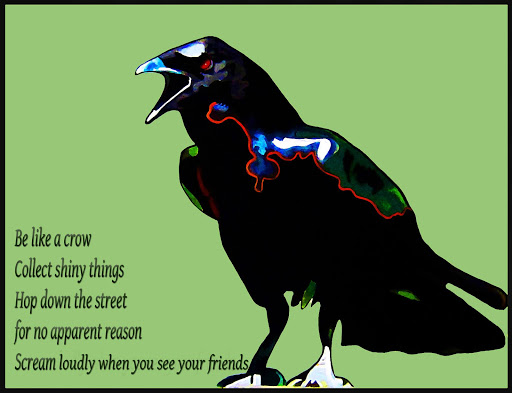Crows seem to love my deck.
Every day they come for a visit.
One by one they line up on the railing.
And they ''chat''. Loudly. And a lot.
I have never really thought of crows as ''beautiful''
but I do find them intriguing.
According to folk lore (depending on culture),
they are cunning, smart and often viewed as ''tricksters''.
After watching a crow ''snowboarding'' (YouTube) down
a snow cowered roof over and over again,
I think I may have to add that they seem to be
able to have fun as well.
Without going into any depth on the subject, is it possible
that because the crow is all black, has piercing eyes,
scavenges around dead things and caws menacingly (to our ears),
many of us perhaps view them as creepy, scary,
and ''bad''?
Some say that the black=bad notion has its roots in
us having a deep-seated tendency to associate darkness
with wickedness. Evil deeds being done under the cover of
darkness and so on.
Strangely however, when it comes to clothing, dressing in black
often seems to represent power, authority, elegance,
sophistication and formality.
I don't know about you, but I am somewhat flummoxed
by why so many religious institutions who claim to represent
the ''good'' (good=white) often dress in black (clergy, priests, nuns,
bishops, rabbis, etc.etc.).
Take a ''goth'' kid for instance, his or her dressing in all
black is often viewed as a sign of rebellion, whereas a clergy
dressed in an ankle-long black cassock is a sign of humility.
Just imagine a judge who enters his courtroom dressed in
a multi-coloured robe, or a doctor who wears all black
scrubs, would you trust them?
Would you trust a solicitor dressed in a red and
white polka dot suit as much as a solicitor dressed in a
black suit?
Bias.
A learned inclination for or against something.
Although, that is often not how we experience it.
Often our biases are hidden from our consciousness
as it is something that we have acquired very early
in our lives at a time when we were too young to be able to
differentiate between fact and opinion.
(Cognitive biases, is an ''umbrella term that refers to
the systematic ways in which context and framing of
information influence individuals' judgement
and decision-making.'')
Basically, biases are repeated patterns of thinking
that have not been scrutinized as to their veracity.
Example:
''Would you like to try a Swedish meatball? They are delicious.''
''No, thanks.''
''Why not?''
"I won't like it.''
''How do you know that you won't like it if you have
never tried eating one?''
''I just know.''
Having biases is part of being human.
We all have them.
Knowing what they are and when they kick in,
has the potential to help us become less quick to
judgement and more open to others perspectives.
''The eye sees only what the mind is prepared to comprehend.''
(Robertson Davies)
''Be like a crow...
Collect shiny things
Hop happily down the street
for no apparent reason
Scream loudly when you see your friends''
(?)
about the image: acrylic on canvas





